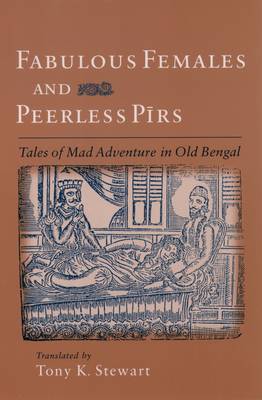
- Retrait gratuit dans votre magasin Club
- 7.000.000 titres dans notre catalogue
- Payer en toute sécurité
- Toujours un magasin près de chez vous
- Retrait gratuit dans votre magasin Club
- 7.000.0000 titres dans notre catalogue
- Payer en toute sécurité
- Toujours un magasin près de chez vous
Fabulous Females and Peerless Pirs
Tales of Mad Adventure in Old Bengal
Livre broché | Anglais
90,45 €
+ 180 points
Description
The mythic figure Satya Pir has a wide following among Hindus and Muslims alike in the Bangla-speaking regions of South Asia. Believed to be an avatara of krsna, or a Sufi saint, or somehow both, he is worshiped for his ability to bring wealth and comfort to a family. At the heart of this worship is the simple proposition that human dignity and morality are dependent upon a proper livelihood-without wealth, people cannot be expected to live moral lives. Men have a special responsibility to create that stability, but sometimes fail miserably, making ill-advised decisions that compromise the women who are dependent upon them. At these threatening junctures, women must take matters into their own hands, and they call on Satya Pir to help them right the wrongs done by their husbands or fathers.
In this book, Tony K. Stewart presents lively translations of eight closely related 18th- and 19th-century Bengali folk tales centered on Satya Pir and the people he helps. To extricate her husband and other family members from these predicaments, one heroine dresses in drag, dons armor to fight cutthroats, slays a raging rhino and hacks off its horn, and takes the prize of the king's daughter, to the consternation of all. In another tale, one woman's husband is magically transformed into a ram and kept by a witch as breeding stock, and another's is transformed into a popinjay parrot, the better to elude her jealous father, intent on protecting his good daughter's virtue. In each case the men are rescued and restored to normal by resourceful women. While the worship of Satya Pir is the ostensible motivation for the tales, they are really demonstrations of the Pir's miraculous powers, which authenticate him as a legitimate object of worship. The tales are also wickedly funny, parodying Brahmins and yogis and kings and sepoys.
These surprising and entertaining stories fly in the face of conventional wisdom about the separation of Muslims and Hindus. Moreover, the stories happily stand alone, speaking with an easily recognized if not universal voice of exasperation and amazement at what life throws at us.
In this book, Tony K. Stewart presents lively translations of eight closely related 18th- and 19th-century Bengali folk tales centered on Satya Pir and the people he helps. To extricate her husband and other family members from these predicaments, one heroine dresses in drag, dons armor to fight cutthroats, slays a raging rhino and hacks off its horn, and takes the prize of the king's daughter, to the consternation of all. In another tale, one woman's husband is magically transformed into a ram and kept by a witch as breeding stock, and another's is transformed into a popinjay parrot, the better to elude her jealous father, intent on protecting his good daughter's virtue. In each case the men are rescued and restored to normal by resourceful women. While the worship of Satya Pir is the ostensible motivation for the tales, they are really demonstrations of the Pir's miraculous powers, which authenticate him as a legitimate object of worship. The tales are also wickedly funny, parodying Brahmins and yogis and kings and sepoys.
These surprising and entertaining stories fly in the face of conventional wisdom about the separation of Muslims and Hindus. Moreover, the stories happily stand alone, speaking with an easily recognized if not universal voice of exasperation and amazement at what life throws at us.
Spécifications
Parties prenantes
- Traducteur(s):
- Editeur:
Contenu
- Nombre de pages :
- 288
- Langue:
- Anglais
Caractéristiques
- EAN:
- 9780195165302
- Date de parution :
- 01-01-04
- Format:
- Livre broché
- Format numérique:
- Trade paperback (VS)
- Dimensions :
- 159 mm x 238 mm
- Poids :
- 408 g

Les avis
Nous publions uniquement les avis qui respectent les conditions requises. Consultez nos conditions pour les avis.





